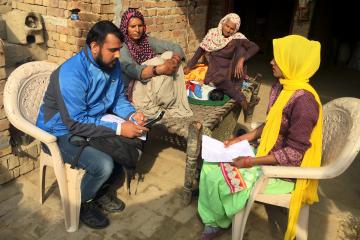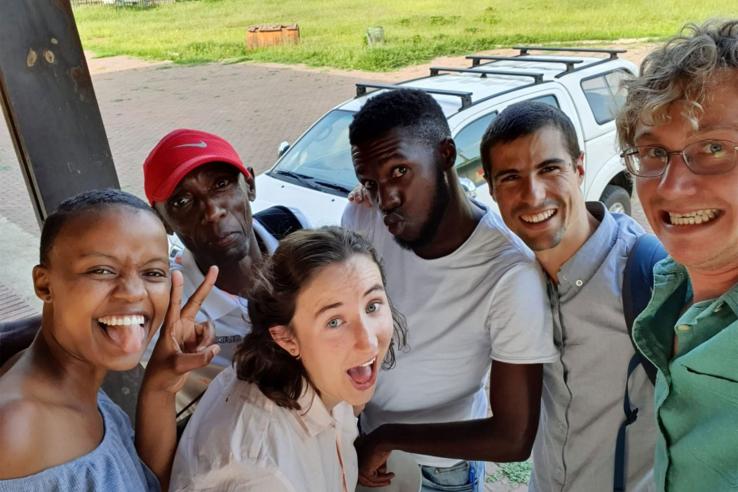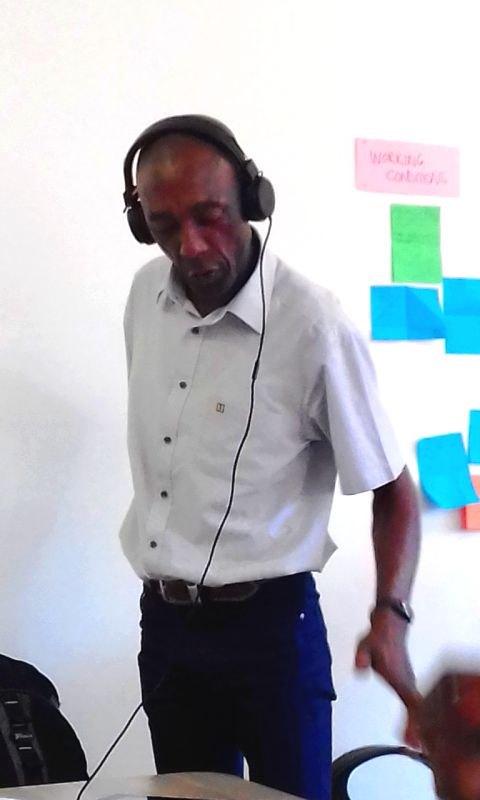
Data collection at J-PAL Africa: Spotlight on field officers

This year, J-PAL hits two milestones: J-PAL Africa reached its 10 year anniversary and, as of February, J-PAL affiliates collectively conducted over 1,000 randomized evaluations. This month, we revisit these milestones with a new perspective.
The COVID-19 pandemic has changed the idea of normal. At J-PAL Africa, we’ve had to adapt to this new landscape in both our research and policy efforts. COVID-19 safety precautions have required us to temporarily halt in-person fieldwork. As a research team, we are sharing resources on conducting phone surveys and discussing shifting to remote surveying.
As a policy team, we are responding to the crisis by collating and sharing evidence relevant to the COVID-19 policy response with partners and stakeholders. This body of research is not only the result of the vision and dedication of our affiliated professors—at the heart of each evaluation is a team of dedicated field officers.
Field officers play a vital role in J-PAL Africa’s research projects: collecting high-quality data, assisting researchers to improve survey questions, contributing to survey translation work, and helping to reduce respondent attrition rates. Throughout the years, our fieldworker team has worked in many different contexts and has developed particular expertise in surveying young jobseekers in urban Johannesburg.
Earlier this year, I interviewed three team members who have been involved in multiple J-PAL Africa research projects in Johannesburg over the years: Siyabonga Mudau, Nonhlanhla Hlanguza, and Joseph Shingange are all from Soweto and have worked as field officers with J-PAL Africa’s research team.
Introducing our interviewees
Joseph “Joey” Shingange, is the longest-running field officer and has worked with J-PAL Africa on about 15 research projects over the last seven years. Nonhlanhla Hlanguza has worked with J-PAL Africa for five years and has worked on about six projects, while Siyabonga Mudau has worked with J-PAL Africa for about four years and has participated in eight projects.
What do J-PAL Africa field officers do?
Nonhlanhla: “a field worker is someone who works outside of the office and travels to different locations collecting data for research purposes. They also communicate with people in different languages.”
Siyabonga and Joey echoed this idea: “for a field officer to do well they have to be able to speak different languages.” This is especially crucial in a context like South Africa, which has 11 official languages and many more unofficial ones. Siyabonga can speak English, TshiVenda, isiZulu and SeSotho. Joey can speak English, Afrikaans, XiTsonga; TshiVenda, isiZulu, SeSotho, SeTswana, SePedi, isiXhosa. "Knowing these languages helps one to be at par with the respondent. Respondents feel more comfortable and the interview goes by quicker because they are speaking in a language they understand. That’s why I have been involved in so many projects.”
What opportunities or skills has being a field officer given you?

According to all three, fieldwork has boosted their self-confidence. Joey: “I got to know how respondents live and how to assist them where possible [...] Before I started working at J-PAL I was quite shy and introverted. I became comfortable with communicating with different people.” Siyabonga reflected that being a field officer has improved his communication skills and helped him become more financially independent. “This was my first real job and I finally got to buy an iPhone which I always wanted,” said Siyabonga.
Nonhlanhla and Joey reflected on the fact that some projects are easier than others. Joey said his favourite project was a transport subsidy study. “We never battled to get respondents due to the fact that they were incentivized with two different travelling cards so we had respondents by the numbers.” Nonhlanhla’s favourite project was a voter registration study: “We were dealing with the youth and therefore I could relate, and it was easy for them to understand the questions we asked.”
Fieldwork also sometimes pushes our staff outside of their comfort zones, in a good way. Siyabonga’s favourite project was one based in mining communities around Johannesburg: “We got to travel to mining-affected communities, we went to these semi-rural areas and I got to see how other people live outside of Joburg. I'm from Johannesburg and everything in the city is easily accessible. People from other provinces must travel to get water, they have to walk a distance to go to shops.”
Nonhlanhla said she learned how to be patient, especially with phone-based surveys. The “call me back later" people need extreme patience: “We work with people who struggle to understand questions, some cannot hear properly, some are difficult because they are a bit sceptical.” Siyabonga was once when he was approached by a group who thought they were trying to win votes for a particular political party during the elections project because of the colour of the tablets they used to collect responses. “They were yellow. We were unharmed but that situation was difficult.”

Our field officers have worked through these challenges as a team. Their collective experience is invaluable and Joey, as the most experienced field officer, has been instrumental in setting a collaborative tone: “I learned the skill of asking questions effectively. I’m also the only field officer that speaks all the official languages and it makes me feel great to be able to help others with that skill.”
Working across generations can be challenging, but the travel and events help bring everybody together, like the year-end function at the Living Room in Maboneng. “We are really tight-knit and we have a great time together as colleagues and friends outside of work,” says Siyabonga. Nonhlanhla’s best moments were travelling to new places and learning new things along the way. Siyabonga concurs: “I have been to Limpopo, Mpumalanga and the North West. We also got to sleep in great lodges!”
Being a field officer for J-PAL Africa has taught all three fieldworks the power of effective communication; patience, and appreciation for the type of life they have. We feel privileged to be able to rely on them to deliver top-quality data collection and appreciate them for all the phenomenal work they have produced over the years.